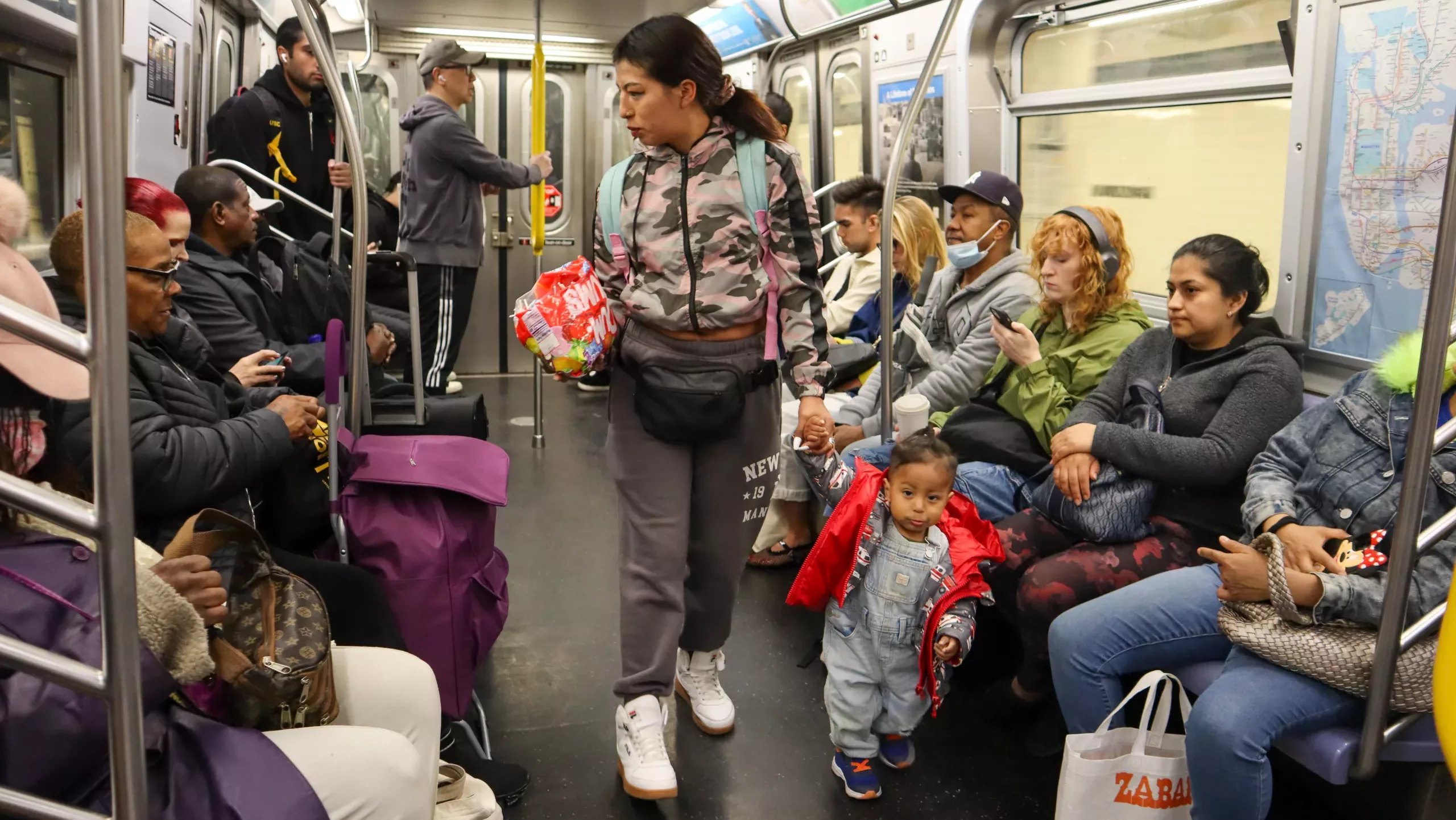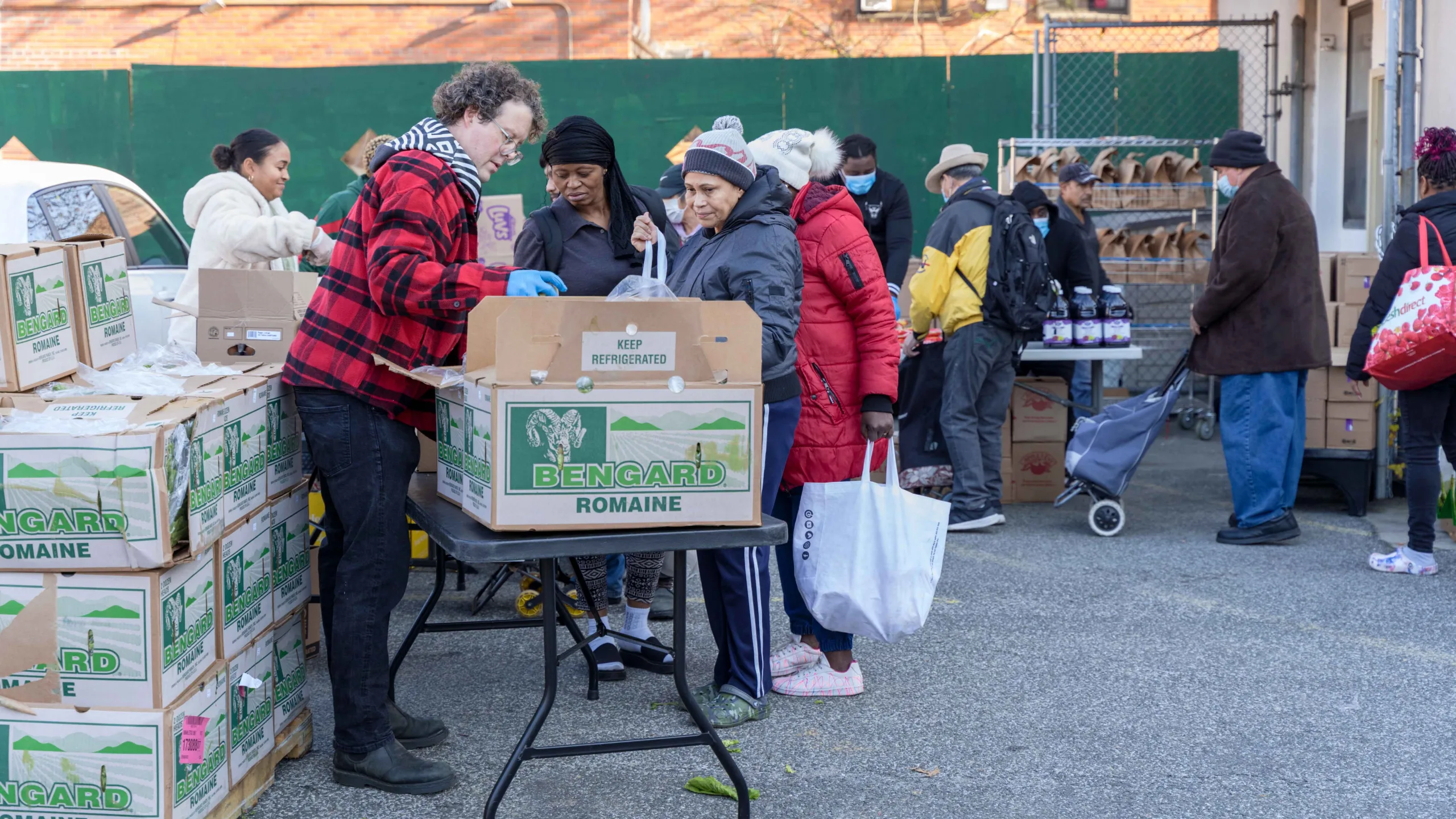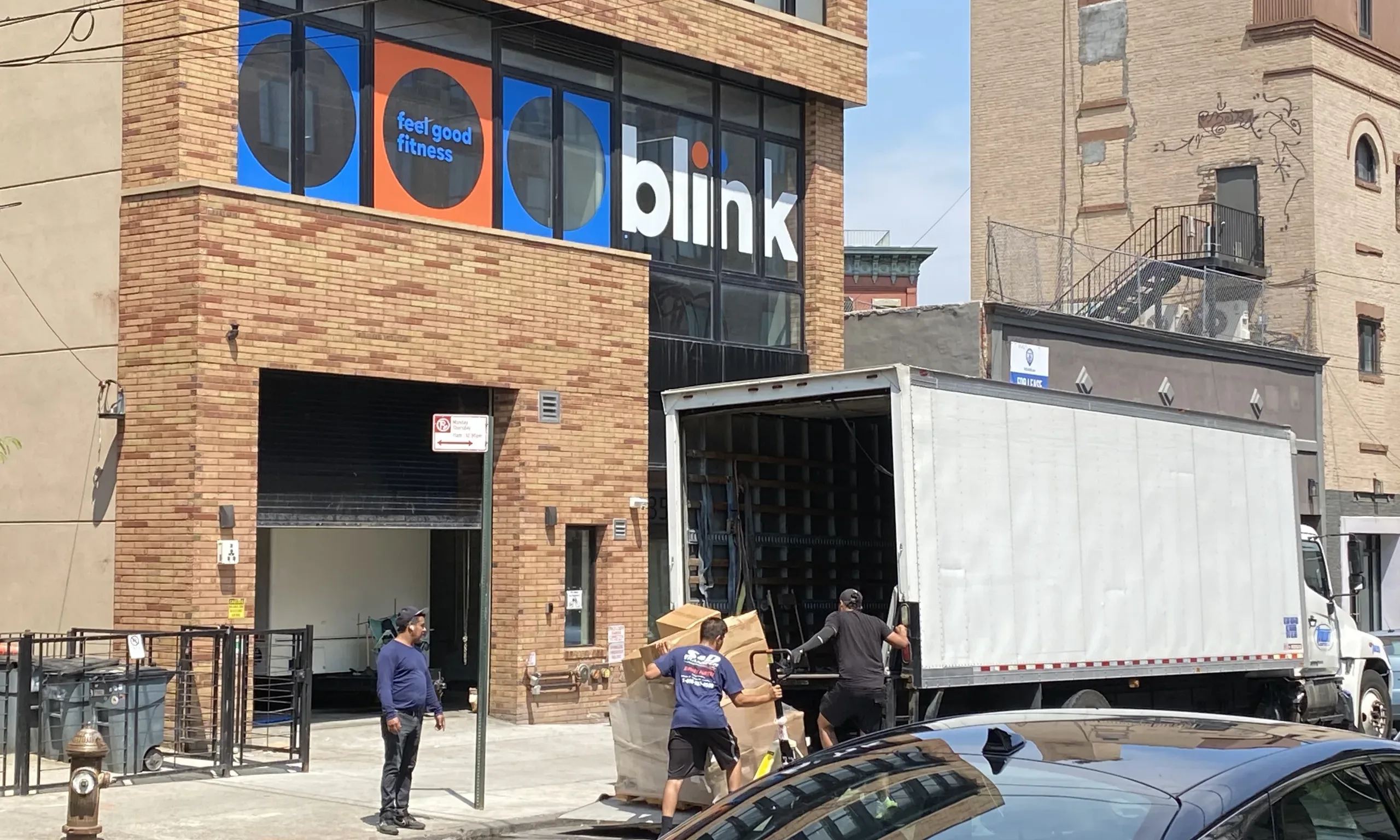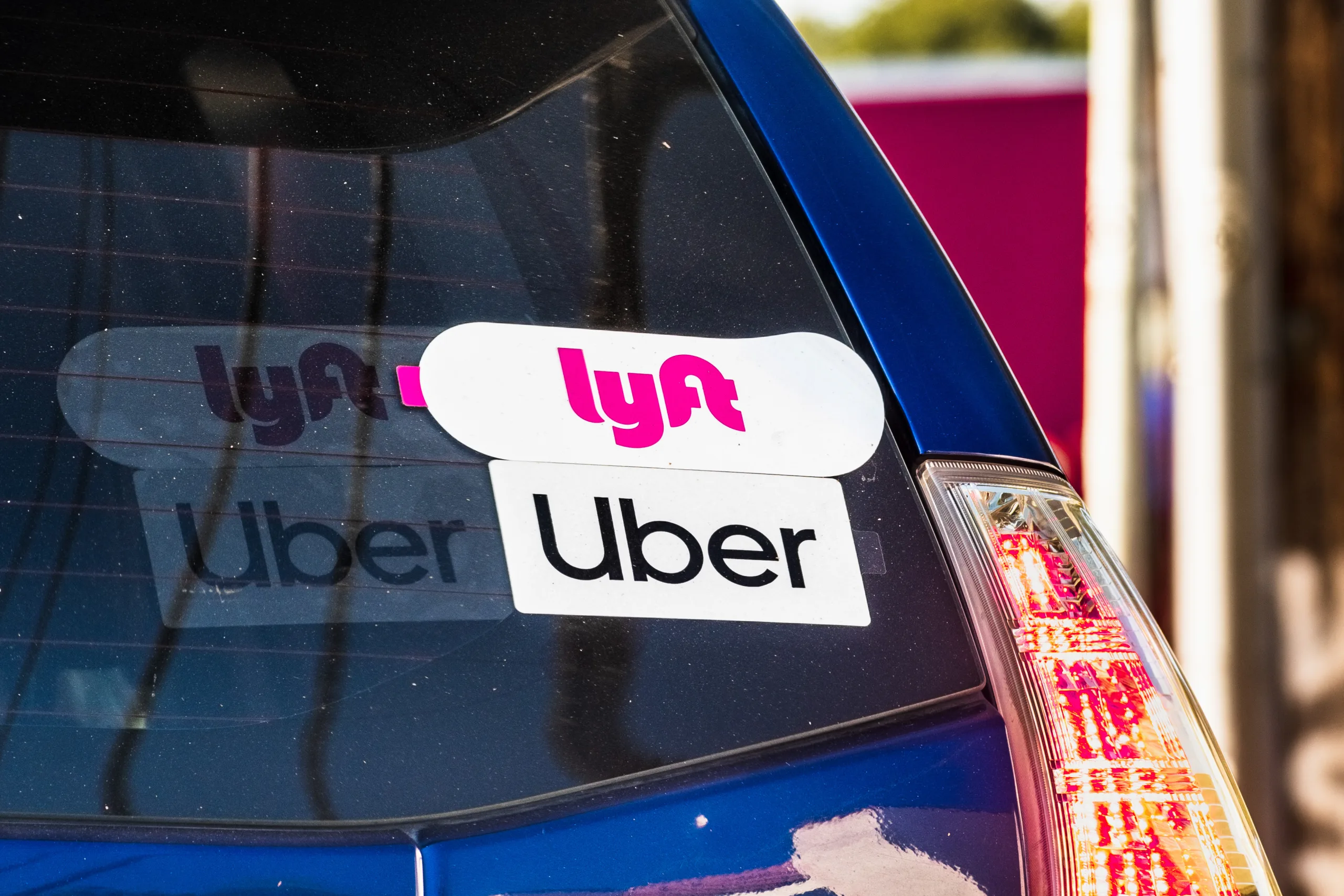When the train arrived that Friday, Tania Semblantes Chango and her 2-year-old son Jeremy jumped on. They stepped over people’s outstretched legs and began offering them Dum-Dums branded mixed-flavor lollipops. Some passengers shook their heads, while others kept them lowered, avoiding eye contact completely. After walking through several train cars, Chango and her son had not made a single dollar. Sometimes, she would have better luck selling on the street or inside of stores, she said.
The mother said she spends her days selling lollipops, chocolates, cookies, and other candies, hopping on and off of trains, and in and out of subway stations. On a good day, she will make about $30 to $35. On the harder days, she will head back to her hotel shelter with only $3 or $4. Sometimes, people will flash her son a smile or hand her some coins and dollar bills. But mostly, they ignore her, she said.
As lunchtime approached, Chango and her son exited the train station onto Lafayette St. in NoHo, and Chango entered Levain Bakery. After going into the store, where no one took her up on buying lollipops, she sat outside on a bench, and began to cry.

“When you try to sell, people act as if we’re not talking to them,” Chango, 21, said in Spanish as she rested on the bench. “But you have to keep fighting to be able to make some money. Because without work, without anything, sometimes we can’t eat. But that’s why sometimes my tears come out like this.”
It’s become a common scene on the New York City trains and subway platforms as more than 195,000 migrants have made their way through city care since last spring: families and their children, offering chocolates, gum, and other candies to New Yorkers in transit across the city. Many of the migrants still lack work authorization because of long waits in the asylum process. They instead have turned to street vending, often without permits (there are about 10,000 people on waitlists for each kind of permit), to make a living — despite the mounting challenges that come with it.
Also Read: DHS Transfers Migrant Families Out of Shelters With 24 to 48 Hour Notice
For months, advocates say they have been asking the city to build a system to support families like Chango’s so that they can sustain themselves through other work opportunities and lean on already available resources that might not be reaching them.
One group of about 20 volunteer bilingual social workers has taken it upon themselves to organize and bring information and case management directly to candy sellers and other vendors. The all-volunteer group — now formally called Algún Día — began canvassing the subways in March to meet candy sellers like Chango. They handed out surveys to the migrants they met, asking them questions about the assistance they were searching for.
“It’s a lot to transition,” said Tiffany Hervas, a social worker and one of the founders of the Algún Día project, about the vendors’ adaptation to New York. “We wanted to be really mindful in how we approach with sensitivity, and come to it from a place of humanity and dignity.”
So far, Hervas said the group has communicated with about 55 newly arrived families who participate in street and subway vending across all five boroughs.
Also Read: An Outdated System Is Preventing Street Vendors From Getting Permits
Chango and her son Jeremy are from Quito, Ecuador, and have been in the U.S. for about a year, largely in New York, but also spent a few months in Ohio. Now, they are living in a hotel shelter with 60-day limits in the Bronx after recently reapplying for shelter at the Roosevelt Hotel intake center, when they reached the two-month limit at their Lower East Side hotel shelter. Chango said she has submitted her asylum application but has not yet obtained her work permit.
Chango often buys lollipops in bulk at bodegas, she said, for about $15, and will accept any money that people will buy them for. But every day, she notices stares from people around her as she sells and hears derogatory comments — sometimes in Spanish — directed at her and other women selling throughout New York.
“We don’t sell candy because we want people to just give us gifts, or anything. It’s because we don’t have a stable job, we don’t have a place to stay, we don’t have support from anyone,” Chango said. “We have to figure out, in whatever way possible, how to push forward.”
Like Chango, the community of new vendors selling candy and other goods are largely Ecuadorian migrants who are staying in a mix of their own housing and city shelters, Hervas said. About three times a week, Algún Día canvasses the subway, parks, streets, and community centers to make contact with recently arrived migrant vendors and identify their most pressing needs, Hervas said.
“A lot of people have felt that the migrant candy seller situation is a demographic that has fallen through the cracks,” she said.
New Yorkers have expressed concern across social media and to various news outlets about children appearing to be selling candy alone or with their parents during hours when they should be in school (children in New York are required to attend school from age six to the end of the school year in which they turn 17).
Volunteers with Algún Día also say that in conversations with candy sellers, they frequently field questions about where to find childcare, how to enroll children in school, and employment opportunities. According to Hervas, families often tell Algún Día’s volunteers: “We don’t want to be selling candy, but it’s really the only thing that we have. It’s not that we want to bring our kids, but we just don’t know where to leave them.”
Also Read: After a Grueling Journey North, a Boy and His Mother Fight to Start Over in New York
As a single mother, Chango says she feels she has little choice on how to make a living, other than to sell candy while bringing along Jeremy, who is not yet required to attend school. “I don’t have a place where to drop off my son so that I can work for both of us to get ahead in life,” Chango said.
Algún Día hopes to fill what they see as these basic information gaps and make resources like childcare accessible to migrants. Jeremy may be eligible for certain free or low cost childcare programs in New York — but only if Chango meets certain requirements and if there is space. Some of the city programs, like vouchers to cover the cost of childcare or free and low-cost childcare through the Department of Education, may require the child to have a legal immigration status — and can be dependent on funding and seat availability.
Promise NYC launched its pilot program last year to give low-cost child care to undocumented children, but the program doesn’t have the capacity yet to reach all the children and families that need it, advocates say, and funding to continue the program is not included in the Mayor’s Executive Budget. Chango says no one yet has pointed to a specific childcare program for Jeremy.

Algún Día has set up in-person and virtual workshops for some of the candy sellers they’ve encountered to cover issues such as workforce development, childcare, education enrollment, adapting to a new cultural environment, and other topics.
Ultimately, the group is looking to develop a year-long program to keep in contact with these families, which will include case management and follow-up, said Hervas, who is also from Ecuador. The group also hosted a roundtable on Monday with various community-based organizations, elected officials, representatives from the Comptroller’s Office and from the Deputy Mayor for Health and Human Services’ team, to develop a plan for working together moving forward.
Chango heard of the workshops hosted by Algún Día on a recent Wednesday in Queens, through other women selling candy she knew and ran into on the subway while working. “Let’s go see what they say,” Chango recalls the other women telling her.
Along with two other women and her son Jeremy, Chango made her way to a community center in Corona to meet with about six social workers from Algún Día, including Hervas, who were there to give the first of a series of several workshops.
Also Read: NYC Shelter Evictions Keep Migrant Youth From Vital Resources
Speaking in Spanish, the social workers discussed how migrants could obtain their IDNYC, enroll in health insurance, and they covered the regulations surrounding education for children in New York, among several other issues. The volunteers also juggled questions about daycare, education enrollment, age requirements, and Occupational Safety and Health Administration (OSHA) certifications for migrants attending in person and on Zoom.
At the workshop, Chango asked social workers how to move forward with a personal family matter involving domestic violence, something she hadn’t found much support with elsewhere, she said. “Truthfully, I have never known if I have a social worker or not,” she said in a later interview, acknowledging that even after months of being in New York city shelters, she wasn’t sure.
Starting this week, City Hall said it was stepping up its outreach in shelters, subways, and other spots across the city, sharing information to parents so that they’re aware of available resources. The materials are delivered in multiple languages, including Spanish and an Ecuadorian dialect, City Hall said. The city is also coordinating with the Metropolitan Transportation Authority and the NYPD to give out materials to families who are selling candy without the necessary permissions, according to City Hall.
In addition, the city is expanding the reach of teams in migrant shelters, who will help families enroll their children in childcare, after-school programs, and Department of Education schools. Along with these initiatives, City Hall said, they are hosting webinars with community-based organizations to coordinate messaging and make sure that the groups are well situated to assist migrant families.
“The health and safety — especially that of children — are always top priorities for our administration,” a spokesperson for City Hall said in a statement to Documented on Monday. “Beginning this week, we are intensifying our work both in migrant shelters and on the subways to ensure school-aged children are enrolled in schools and parents know about safe after-school and child care programs available to kids.”
Previously, Gothamist reported in April that City Hall said they would work with the Department of Homeless Services, the NYPD, the Metropolitan Transportation Authority, and homeless outreach contractors to hand out “flyers” and “palm cards” (palm-sized cards) to migrant families to dissuade them from selling goods on the subway.
In recent conversations with the team for the Deputy Mayor for Health and Human Services in the past several weeks, Hervas said that Algún Día explicitly stated to the city that an “enforcement-based approach is not the way to go.” So when they heard that uniformed workers, like the NYPD, would potentially be approaching migrants, Hervas said they were initially disappointed. “It’s going to create a sense of fear across the board,” she said.
“We know that the city is doing their best efforts, and seeking to collaborate with us,” Hervas added, saying that any approach should not just be about discouraging migrant families from selling on the trains but about “encouraging them to seek services.”
Elizabeth Conde, a social worker who is also volunteering with the Algún Día project, said that while speaking with candy sellers and other vendors on the subway, several asked her about how to deal with tickets they’ve received while selling, what to do if the police stopped them, and what kind of legal rights they have. Some of the vendors said they were “scared of the cops,” Conde said.
TestPost3
Chango, for her part, says when she sees the police approaching, she immediately hides the candy she’s selling in her backpack. Fines for unlicensed street vending can reach into the thousands, city food vendor rules show.
“I’ve already seen the young women selling on the train, they [the police] make them get off the train and take their candy,” she said.
In the meantime, Chango is waiting for her work permit and plans to continue selling candy across the city until she can access childcare and obtain more secure employment. But she hopes that one day she’ll be able to enroll in English classes and find housing that is their own.
“I’ve had to swallow my pride,” she said. “If we had a stable job, we wouldn’t be like this — selling on the streets.”












